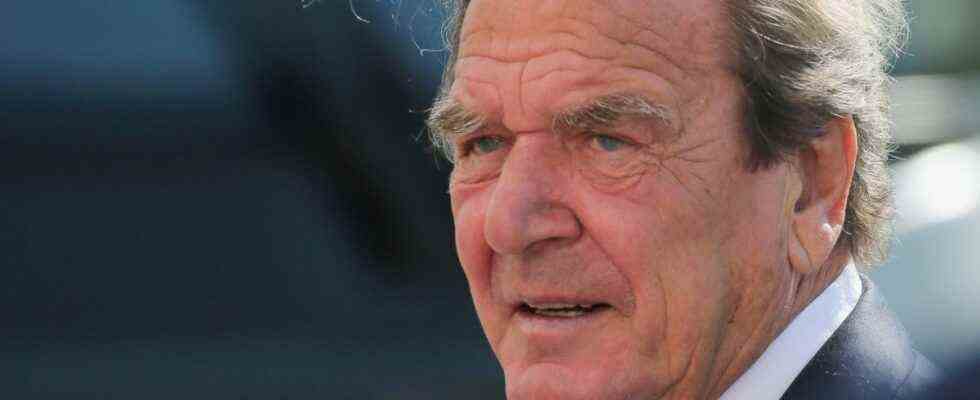Gerhard Schröder has seldom shown excessive sensitivity when dealing with his own party. At the end of 2005, when Schröder had not been chancellor for just 17 days, the news came that he would become head of the supervisory board of the oil pipeline company Nord Stream AG. Parts of the SPD were appalled. “I wouldn’t have done that,” said Peter Struck, the new parliamentary group leader at the time – and that was one of the friendlier comments.
Schröder waited 58 days this time. That’s how long the SPD government under Schröder’s successor, Olaf Scholz, has been in office. And now the news is coming that Schröder is to join Gazprom’s supervisory board in July. Gazprom, the largest and most important Russian group of all, closely linked to the political leadership, is striving for international expansion, which is shown by the fact that the company has also been the main sponsor of Schalke 04 for 15 years. You can hardly get any closer to the Kremlin.
Schröder had recently criticized Ukraine’s demands for arms deliveries as “saber rattling”, much to Moscow’s delight. He also blamed NATO for the Russian troop deployment on the Ukrainian border. Both statements that were likely to trigger international concerns about the foreign policy reliability of the government in Berlin. Confronted with this in the ZDF interview, Scholz felt the need to clarify: “If I understand the constitutional order of the Federal Republic of Germany correctly, there is only one Chancellor, and that’s me,” he said. A sentence that almost sounded like Schröder when he was still in charge of the country.
And just like back then, when the SPD had to cope with the loss of power after seven years of red-green politics and had to squeeze itself into a grand coalition under Angela Merkel, these are not easy times for the Social Democrats either. The initial enthusiasm of the traffic light government seems to have disappeared, and criticism is coming from all sides. The critics say that the SPD and its chancellor would not cut a good figure in the Ukraine crisis and in dealing with Russia. You can hear that not only in Berlin; the German ambassador in Washington was also recently warned. And yet Scholz continues to deliver sentences in which he – typical for him – is not very specific. Phrases like: “Anything-that-is-necessary-will-be-done.”
If you take a closer look, the situation for Scholz and his SPD is even worse today than it was in 2005. At that time, Schröder’s smooth transition from chancellor to lobbyist was an inner-social-democratic, maybe even an inner-German problem. The matter dominated the headlines for a few months, Schröder was nicknamed “Gerd-Gas”, but when Nord Stream AG declared that it did not need a German guarantee granted by Schröder’s chancellorship in the last few days, the discussion slowly died down .
This time the whole world is watching how the new German government presents itself. The news of Schröder’s new job comes at an inopportune time for the SPD, which is struggling between two camps that are hard to keep together in its relationship with Russia. Especially for Chancellor Scholz, who is already under criticism.
As the Russian news agency Interfax reports, Schröder is to be confirmed at the supervisory board meeting at the end of June. His name is on a list of ten people to form the panel. The 77-year-old Schröder is to replace Timur Kulibayev, a son-in-law of former Kazakh President Nursultan Nazarbayev, who was ousted in the wake of the January riots.
The planned seat on the supervisory board would be the fourth post that Schröder has accepted in the Russian energy sector. The former Chancellor is the head of the shareholders’ meeting of Nord Stream AG and also president of the board of directors of Nord Stream 2 AG. Nord Stream AG, in which German, Dutch and French companies also hold shares alongside Gazprom as the majority shareholder, operates the first gas pipeline through the North Sea, which was inaugurated in 2011. Nord Stream 2 AG, based in Zug, Switzerland, and wholly owned by Gazprom, is responsible for the planned second pipeline, which is currently the subject of much debate.
In addition, Schröder is the chairman of the supervisory board of the Russian oil company Rosneft, also a huge company and also closely linked to the political leadership in Moscow. In addition, Rosneft has stakes in a number of refineries in Germany.
All Supervisory Board positions are well endowed. Earlier estimates, which may no longer be entirely up-to-date, came from EUR 250,000 for the commitment to Nord Stream AG and EUR 600,000 for the position at Rosneft.
“He harms the country he is meant to serve”
Sharp tones have long been coming from the opposition. So wrote the FDP defense politician Marie-Agnes Strack-Zimmermann on twitter: “It’s time to think concretely about withdrawing Gerhard Schröder’s equipment from a former chancellor. He’s damaging the country he’s supposed to be serving.” Stefan Müller, the parliamentary manager of the CSU in the Bundestag, made a similar statement. “Those who allow themselves to be paid by autocrats don’t need money from German taxpayers,” said Müller.
In the SPD, on the other hand, it has been quiet so far. In the past few days, leading Social Democrats have sharply criticized Schröder’s statements on the Ukraine crisis. So far there has been no comment on the ex-chancellor’s new job. Perhaps most of the SPD are asking themselves anyway: What else can one say about that?

